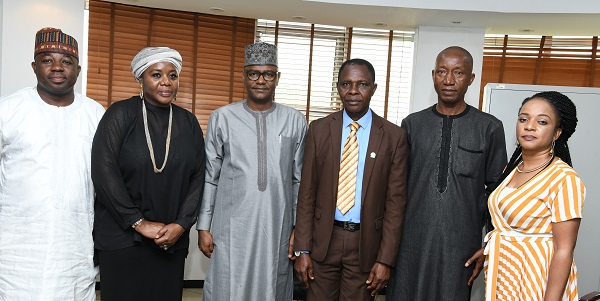
The Nigerian Communications Commission (NCC) has said it is willing and ready to offer any support required by the National Blood Service Commission (NBSC) to enable the latter to achieve its mandate of regulating, coordinating and ensuring “the provision of safe, quality blood and blood products” to all persons who may need such in Nigeria.
The director, human capital and administration (DHCA), NCC, Usman Malah, who led the NCC team to receive the NBSC delegation on behalf of the executive vice-chairman of NCC, Prof. Umar Danbatta, made the commitment when the director-general of the NBSC, Dr. Omale Amedu, led a delegation to the NCC on a courtesy visit recently.
Amedu said the visit was to share information with NCC about the mandate of the NBSC, established under the National Blood Service Commission Act of 2021, to reduce the prevalence of diseases transmitted through blood, enhance public awareness of blood safety and voluntary non-remunerated blood donation and rally a committed team of voluntary blood donors, thereby building a national strategic safe blood reserve.
Also, the NBSC boss said while June 14 had long been designated by the World Health Organisation (WHO) as Blood Donor Day, Nigeria has additionally declared December 8 to show commitment to building sufficient blood reserves, considering the significance of blood to human survival and the centrality of blood and blood products, among resources used in the production of cancer management drugs.
Amedu emphasised that NBSC considered NCC as a leading MDA in Nigeria, hence the decision to visit NCC as part of NBSC’s sensitisation of ministries, departments and agencies (MDAs) and other stakeholders on the need for regular blood donation. He commended NCC for its strides in ensuring improved connectivity and remarkable contribution to the digital economic agenda of government as well as to the gross domestic product (GDP).
Responding further, the DHCA thanked Amedu and his team for the visit, the kind words on the strides of the NCC and NBSC’s collaborative spirit which – he noted – aligned substantially with a strategic objective focus of NCC that speaks to partnership and collaboration with stakeholders.
Malah said the staff of the NCC are public-spirited, and many would be willing to donate blood voluntarily. Also, he promised that a recommendation would be made to management to institute a special in-house sensitisation programme to further explore deepening support for the NBSC, to enable it achieve its mandate.
On the request hitherto made by NBSC to NCC to explore the use of telecom platforms to disseminate information about its activities, the DHCA said there are rules governing the telecom sector and the commission would not want to breach such extant rules, policies and directions.
In a statement by the director, public affairs, Reuben Muoka, Malah recommended that the NBSC reach out to mobile network operators (MNOs) to agree on how the networks can be used to support the accomplishment of its mandate, which he described as “laudable and central to human existence and sustenance”.


